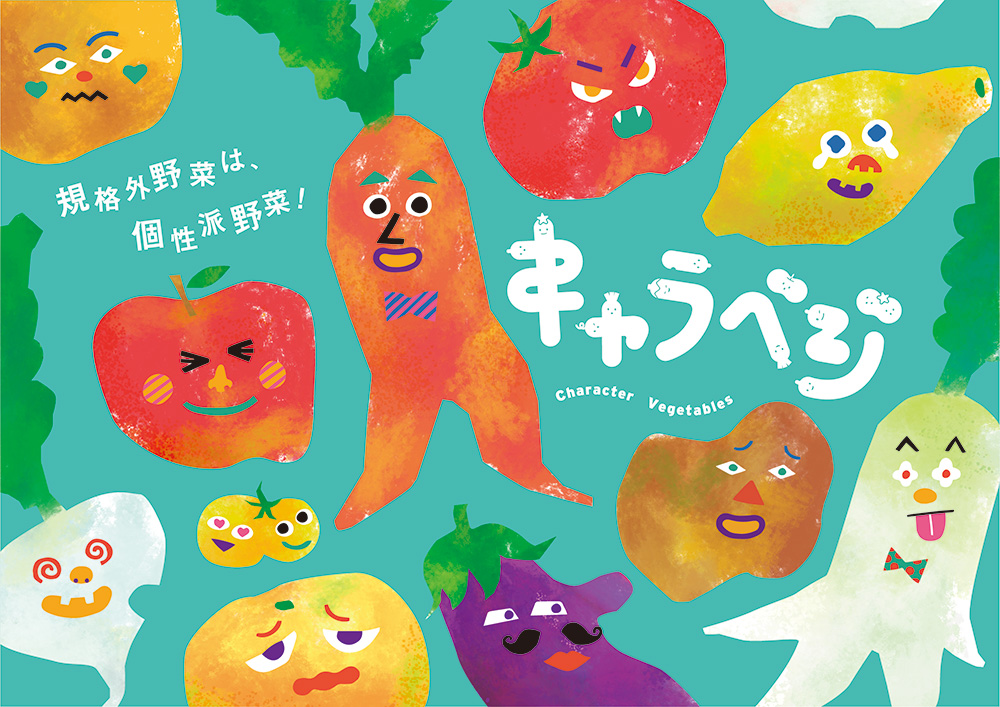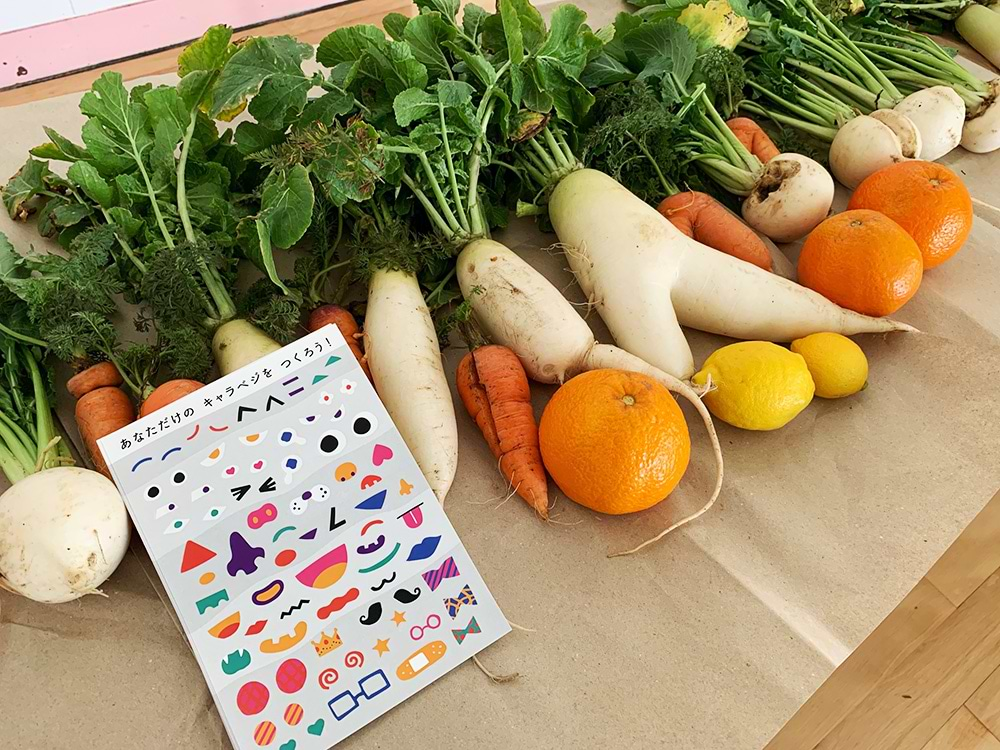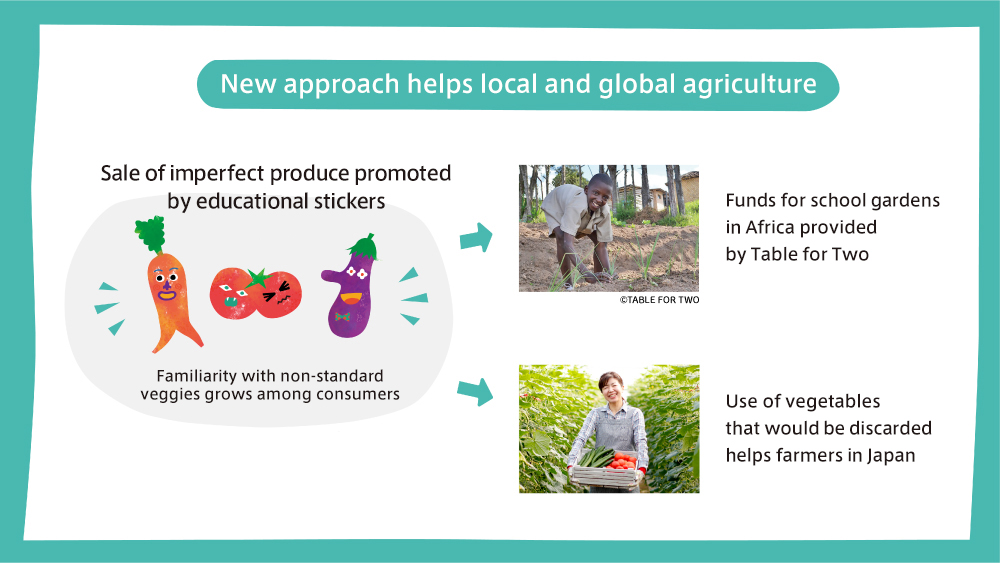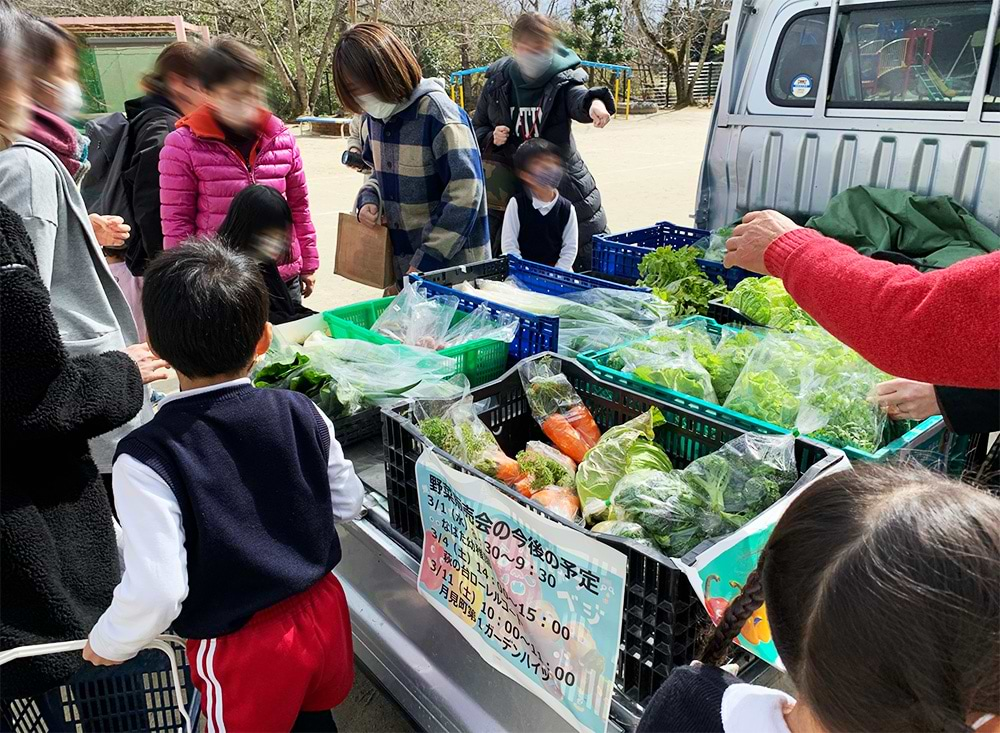At Dentsu’s Customer Experience Creative Center, a project team nicknamed Arikara ( a coined word meaning “sales creativity” in Japanese), is creatively connecting a wider range of consumers to imperfect vegetables. With more people coming to like the items, sales are growing. Recently, the team addressed a major cause of food loss in Japan—vegetables being rejected for sale at supermarkets due to imperfections.
As part of its Charavegi (vegetable character) Project, the team has produced a set of stickers depicting facial parts. These can be combined to create faces that can be placed on such veggies, allowing buyers to express the personality of each item. By making non-standard produce more attractive, the team hopes to raise the sales value.

In this article, Takuya Fujita, a member of the creative center and the project team, talks about the background of the project and a related workshop held at a kindergarten in Akoma City, Nara Prefecture. He also discusses new possibilities for non-standard vegetables and possible business opportunities.
| <Headings> |
|---|
New approach to selling non-standard produce
Disposal of non-standard vegetables is a serious issue for farmers in Japan. Despite being flavorful, vegetables that do not meet accepted standards in terms of shape, size, and color are neither shipped out by farmers nor sold at supermarkets or green grocers. This results in their disposal which, in Japan, contributes to annual food loss of an estimated 1.8 million tons.
In recent years, growers have started selling non-standard vegetables directly to consumers through online shopping sites. Nevertheless, due to the negative image of imperfect produce, it sells for less than items that meet market standards.
For this reason, Dentsu’s Urikuri project team wanted to reverse the practice. We believe that creating a positive image for imperfect vegetables will add to their value and encourage consumers to buy them.
Starting small—with character stickers
We decided to create a set of stickers comprising facial parts that people could have fun combining to design cute faces on the veggies. By giving the imperfect items their own character and personality, we thought people would be more likely to buy and eat them. Based on this approach, we focused on the following three points.
First, we designed stickers that could express the character of vegetables. People are naturally draw to things that have a face and, given that manga and anime are firmly rooted in Japan’s culture, people tend to feel an affinity with the characters. So, we thought character stickers would attract consumer interest, particularly from families, while offering them a familiar way to learn more about non-standard vegetables.

Second, we thought the character stickers offer an effective way of starting out small. As putting them on vegetables is simple, it is easy for users to try out the stickers. This can be done at such places as roadside markets, supermarkets, and online shopping sites. The fact that all kinds of people can use the stickers in ways that suit the settings is a major advantage.
Third, our project was designed to make non-standard veggies seem more valuable.
Generally, people believe it a waste to throw away these vegetables, and that it is better to sell them. Yet, while doing research on what farmers actually think about non-standard vegetables, we discovered a big gap between their views and those of the general public.
We received different comments from farmers. For example, some said there are many types of imperfect vegetables, including some that should not be eaten. Moreover, vegetables thrown away in fields help fertilize the soil. Some worried that standard vegetable prices might drop if so-called inferior items were sold, rather than thrown away, which could make farming unprofitable over the long term.
This meant that the gap between the views of farmers and of the general public would not be narrowed by a project aiming to encourage consumers to buy non-standard vegetables because throwing them away is wasteful. For this reason, our project focused on promoting the distinctive shapes, sizes, and colors of non-standard vegetables as original and positive features. Were they no longer seen negatively, as veggies that fall short of standards, their value might increase.
In addition, we produced an educational kit about current farming practices and non-standard vegetables, in the hope that it would help people better understand the agriculture industry, create opportunities for people to come across imperfect vegetables, and change how those vegetables are generally perceived.
Local imperfect vegetable sales help developing countries
We designed the project to help not only agriculture in Japan, but also to support healthy eating worldwide. Part of the sales of non-standard vegetables sold through the project is used to fund school vegetable gardens in several African countries.
This is being done through a non-profit organization (NPO) called Table for Two. In developing countries, the non-profit is working to combat poverty; and in developed countries, it is trying to help reduce obesity and other health-related issues caused by unhealthy eating.
Originally established in Japan, the NPO has initiated a number of social contribution activities, including a meal-sharing program that donates meals to people in developing nations from the proceeds of meals sold in advanced countries.
The arrangement, which allows consumers to provide funds for school gardens in Africa, helps children and their families by purchasing non-standard vegetables here in Japan. By contributing to domestic agriculture, it raises awareness of, and makes practical contributions to, global food issues.

Positive response at workshop
We wanted to find out how our character stickers would be received by consumers, so we looked for venues where we could promote the project. When the Ikoma City, Nara Prefecture, government department in charge of promoting the UN Sustainable Development Goals expressed interest this year in our initiative, it helped us set up a workshop at the city’s Tawaraguchi Kindergarten in February 2023.
Many children, parents, and teachers got a chance to use the character stickers. Based on the idea of saving vegetables from being thrown away, we held a fun educational quiz about food loss, explained how imperfect vegetables are wasted, and showed everyone how to make characters with the stickers. An association that promotes the city’s agriculture provided the workshop with an assortment of non-standard vegetables, including daikon radishes, turnips, scallions, carrots, mikan oranges, and lemons.

The children were very interested in the vegetables, which differed in size and shape from those generally found in supermarkets. They laughed as they showed each other the expressions—happy, angry, sad, confused, grinning, surprised, and silly faces—they had created by adding stickers of facial parts to match the shape of the vegetables, as well as the bandage-shaped stickers they had used to cover up cracks and blemishes on the vegetables. The children had as much fun being creative as they would have had making a favorite toy. Finally, they took home the vegetables they had adorned to eat with their families.

After the workshop, we asked the participants whether they would be interested in purchasing character stickers and non-standard vegetables as a set at a supermarket or other store. Some 80% responded positively. This suggests that many of the parents and their children had learned something about the issue of food loss and non-standard vegetables by having participated in the workshop.
We asked the city’s agricultural association that had provided the non-standard vegetables to donate a portion of their vegetable sales to the Table for Two NPO, to help support children in developing countries. The donations it raised provided 100 meals for such children.

Promoting the initiative to a wider audience
The character stickers we created for this project can be used in a variety of settings besides supermarkets and green grocers. Indeed, we believe they can be useful for agricultural associations, municipal governments, retail stores, and manufacturers.
For example, if the stickers are packaged as an educational kit, they could be sold at book and toy stores. Such educational kits could also be used by restaurants to create healthy menus for children. If used for activities inside stores while shopping, perhaps kits could help parents by preventing their kids from getting bored; the activities are fun, stimulating, and involve eating tasty food.
In addition, the character stickers provide an excellent way of using intellectual property* through licensing and merchandising agreements. Stickers can be designed to depict popular anime characters, athletes, and artists, and be sold with nonstandard vegetables at anime events, sporting events, and concerts, thereby linking regions where the vegetables are grown with image rights holders. This would allow rights holders and their fans together to support local farmers, reduce food loss, and combat hunger in developing countries through donations. Moreover, the fans could have fun buying the vegetables in an all-new way.
Our project has just begun. We hope to expand the possibilities for the character stickers and contribute to sustainability in enjoyable and exciting ways by collaborating with all kinds of organizations and releasing innovative new products.
| * | Intellectual property includes ideas, creations, content, and other assets produced by individuals and companies. |
|---|
Related Link
Giving Imperfect Veggies Character to End Food Waste (Japanese language only)
